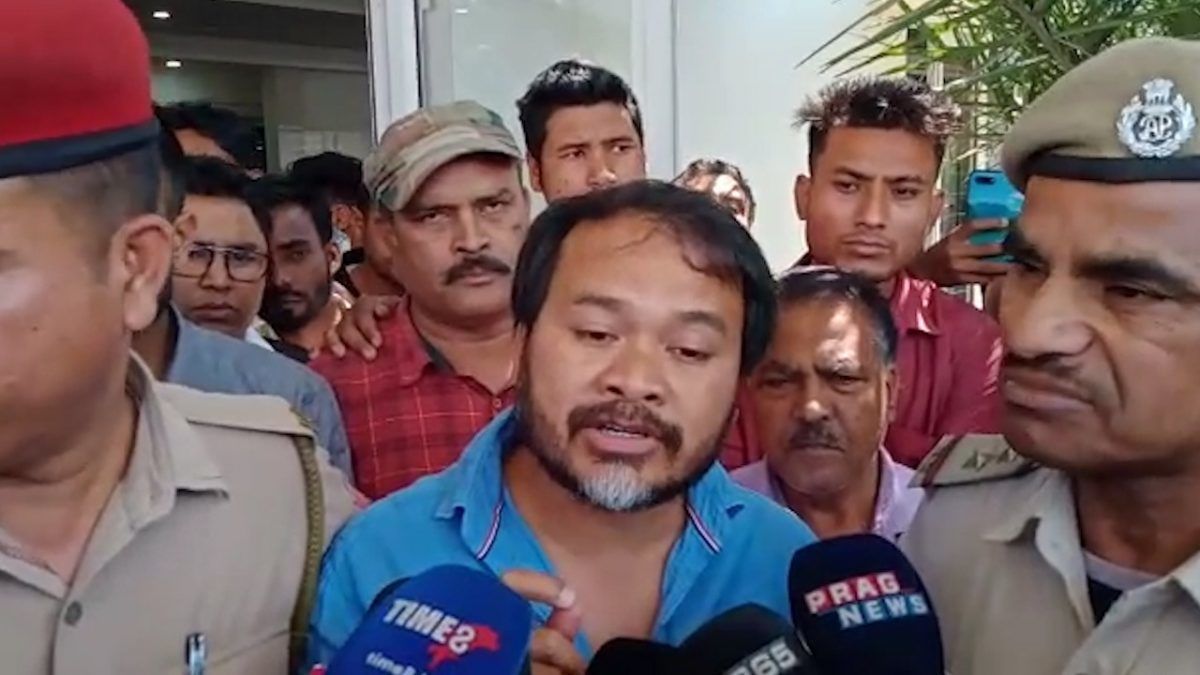
The Gauhati High Court refused to interfere with the order of Special NIA Court granting bail to Akhil Gogoi who was charged under the Unlawful Activities (Prevention) Act (UAPA). The Division bench of Justices Suman Shyam and Mir Alfaz Ali found no infirmity in the order and dismissed the appeal filed by the National Investigation Agency (NIA) deeming it to be devoid of merit.
The appeal was filed by NIA against the Special NIA court, Guwahati order passed in October 2020 granting bail to Akhil Gogoi. The special court had held that the materials against Gogoi cannot be prima-facie said to be a “terrorist act” done with the intention of threatening the unity, integrity and sovereignty of India or a terrorist act done with the intention to strike terror in the people, and thus granted bail.
The case against Gogoi is that in December 2019, he led a crowd of around 6,000 people in Dibrugarh causing economic blockade and had pelted stones in which the Sub-Inspector Tulumoni Duwarah was injured. In the FIR it was alleged that the mob had tried to murder police personnel on duty. In a matter of days, the case was transferred to NIA and Gogoi and other accused were charged under UAPA. The special court granted bail to the respondent, Gogoi, and thus NIA filed this appeal before the High Court.
Arguments
The NIA submitted that Gogoi led the entire movement which had turned into a violent protest, where a Railway Station and a police vehicle was burnt down besides
spreading sporadic incidents of violence and stone pelting upon the police personnel. Also, at the instance of the respondent, a conspiracy was hatched by the accused persons to attack a particular community of that locality so as to disturb the unity and integrity of the country.
The counsel for NIA submitted that the special court erroneously ignored the incriminating materials available on record demonstrating the strong likelihood of conviction of the respondent and had employed a completely different standard while considering the bail application.
The counsel for the respondent argued that the materials annexed to the charge-sheet does not disclose any ingredient to prima facie presume that the respondent was guilty of any offence committed under section 15(1) of UAPA and thus the bail was rightly granted. He further argued that Citizenship amendment Act (CAA)is a very sensitive issue for people of Assam, and the protests were spontaneous and that there was anger amongst the protestors which had turned violent leading to arson and stone pelting. He contended that there was nothing on record to show that the respondent had ever asked the mob to resort to violence or to attack any community.
Court’s observations
The court observed that “an unlawful activity under section 2(1)(o) of the Act of 1967
could even be spoken words including a provocative speeches but in order to
constitute an offence under the Act of 1967 the same must be done with the
intention to cause death of , or injuries to any person or persons, or to cause loss of or
damage to or destruction of any property aimed at disturbing the unity, integrity,
security and sovereignty of the country”.
The court observed that unless the act complained of strictly comes within the letter and spirit of section 2(1)(o) read with section 15(1) of the Act, the provisions of the Act will not be applicable. Section 2(1)(o) defines unlawful activity and section 15(1) defines a terrorist act. The court thus inferred that unlawful act of any other nature, including acts arson and violence aimed at creating civil disturbance and law and order problems, which may be punishable under the ordinary law, would not come within the purview of section 15(1) of the Act unless committed with the requisite intention.
The court pointed out that section 43D(5) of UAPA imposes fetters on the discretionary power of the Court to release an accused on bail if the court is of the opinion that the accusation is prima facie true. Thus, the accused has to show that the materials on record taken on face value would not establish his guilt and the agency has to produce materials to enable the court to believe that the accused in guilty.
The court cited NIA Vs Zaroor Ahmed Shah Watali (2019) and stated that it will only consider the correctness of the approach of the Special Court in passing the bail order.
The court stated that “It may be true that taking advantage of the public sentiment associated with enactment of CAA, the respondent had delivered fiery speeches whipping up strong passion amongst the masses, which in turn, had led to violent activities which are punishable under the law. It may also be correct to say that the violence resorted by the members of the mob was the direct fall out of the speech delivered by the respondent.”
The court however accorded significance to consider whether Gogoi’s speeches were delivered with the intent to commit a “terrorist act” thereby challenging the unity, integrity, security and sovereignty of India and whether the materials placed on record was sufficient to make the court prima facie believe the same.
The court held that the view held by the special court while granting bail “is a possible view in the facts and circumstances of the case” and thus, found no error in the court’s approach. The court recognised the power to grant bail to be discretionary and held that, “While examining the correctness of the decision rendered in exercise of such discretionary power, if two views are possible, the appellate court would be loath in interfering with the view of the Court below”.
The court, thus, refused to interfere with the order of the Special Court granting bail to Gogoi and held the appeal to be devoid of merit and thus dismissed it.
The complete order may be read here:
Related:
Anti CAA protests: Gauhati HC denies bail to two booked under UAPA